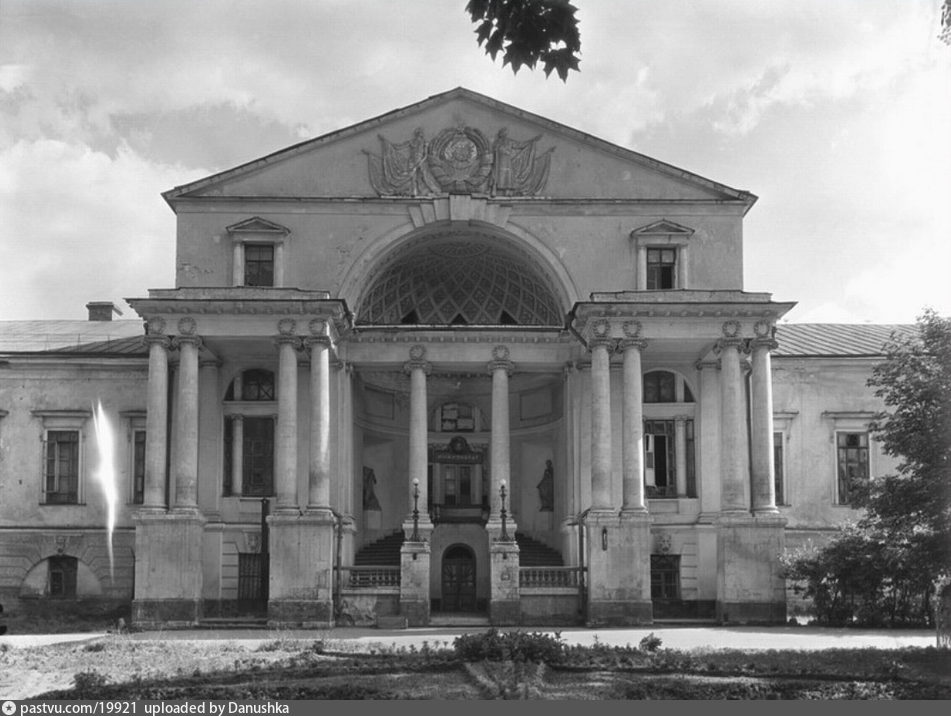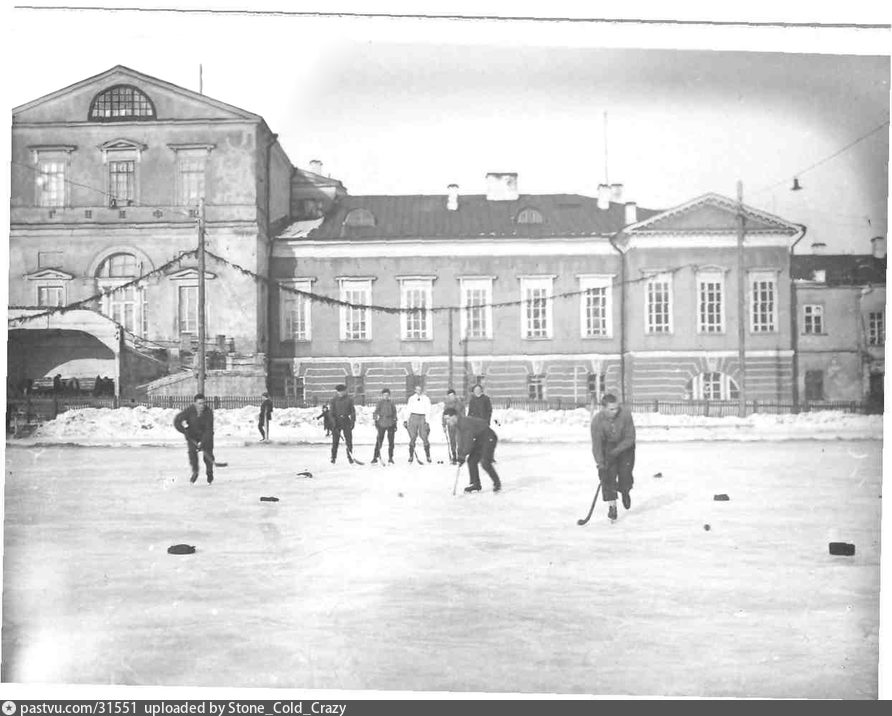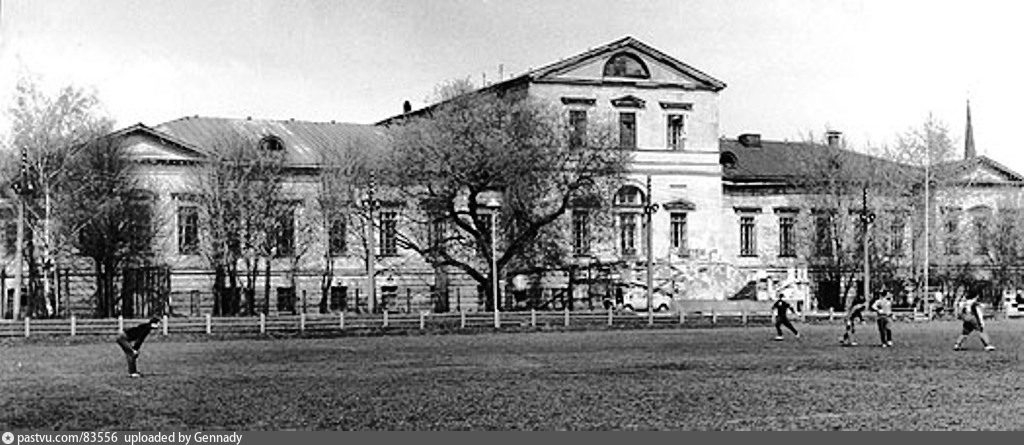Anatoly Tarasov (1918-1995)
Early Years
Born in Moscow, December 1918. Father Vladimir, an accountant, dies when Anatoly is nine or ten. Mother Yekaterina works as a sewing machinist. One brother: Yury (1923-1950). Anatoly grows up playing "football" (soccer, during the summer) and "hockey" (bandy, during the winter) in the vacant lots of Moscow.
1930: Joins youth wing of Dinamo Moscow. Plays soccer and bandy for them until 1937.
1933: Finishes secondary school, begins to attend a factory apprenticeship school.
1934-37: Works as a mechanic at an aircraft plant to support family.
1937-39: Attends the State Central Institute of Physical Culture where soccer coach and theorist Mikhail Tovarovsky leaves a lasting impression on him. Attends a course on Canadian hockey held by Tovarovsky. Meets his future wife Nina Zabelina, a gymnast. Works as soccer coach with a factory team in Zagorsk (Sergiev Posad, ~70km/44mi from Moscow) alongside his studies.
August 1939: Graduates from the Institute of Physical Culture and marries Nina Zabelina. Begins career as full-time athlete and joins Dinamo Odessa (Ukraine, ~1140km/700mi from Moscow) for the remainder of the soccer season.
November 1939: Joins the bandy team of Krylya Sovietov Moscow (captained by Vladimir Yegorov, later his assistant with the Soviet hockey team).
Army and Air Force
February 1940: Drafted into the army and sent to the Moscow Aviation School. Becomes player-coach of the school team.
April 1940: Assigned to the army sports club TsDKA (
Tsentralnovo
doma
Krasnoj
Armii, "Central House of the Red Army", Moscow). Plays soccer for them, but more with the second than with the first team.
February 1941: His wife Nina gives birth to a daughter, Galina.
June 1941: During his second season with TsDKA the soccer league is shut down abortively after the
German Invasion of the USSR.
1941-1945: Spends most of the "Great Patriotic War" as a military instructor training soldiers.
Winter 1944-45: Wins Moscow Cup with TsDKA bandy team under Pavel Korotkov. Among his teammates are Vsevolod Bobrov, Yevgeny Babich and Aleksandr Vinogradov.
May 1945: German surrender ends war in Europe. Soviet soccer league reopens with TsDKA being coached by Boris Arkadyev. Being a leading soccer theorist, Arkadyev becomes Tarasov's "second mentor" after Tovarovsky.
Winter 1945-46: Tarasov wins Moscow Cup and USSR Cup with TsDKA bandy team. Bandy teams play Canadian hockey in exhibitions matches with Tarasov reportedly explaining the basics to those unfamiliar with the game.
April 1946: Returns to coach his former Aviation School team that has now become the Air Force (VVS) club. Soccer team gains promotion to first tier under his guidance.
Winter 1946-47: First Soviet championship in Canadian hockey sees a lot of leading bandy players trying out "hockey with the puck". VVS finishes 5th (out of 12 teams), player-coach Tarasov is the tournament's best goal scorer (14 goals in 6 games). Championship is won by Dinamo Moscow under Arkady Chernyshov.
February 1947: Second daughter Tatyana is born.
July 1947: Vasily Stalin, son of the dictator
Iosif Stalin, is appointed deputy commander of the Air Force (VVS) of the Moscow Military District (MVO). Not getting along him, Tarasov soon finds himself replaced as Air Force coach and returns to TsDKA (still under Boris Arkadyev) half-way through the soccer season.
First term as Army coach (1947-1961)
1947-1953:
Winter 1947-48: Replaces Pavel Korotkov as player-coach of the TsDKA hockey section. Centering a forward line with Vsevolod Bobrov (LW) and Yevgeny Babich (RW), he leads the team to its first championship.
February 1948: LTC Prague in Moscow. The leading hockey club in Europe plays several exhibition games against Soviet teams.
1948-49, 1949-50: Tarasov manages to defend the title with TsDKA even though Vasily Stalin begins to lure away players, most notably Bobrov (1949).
January 1950: Sverdlovsk air disaster.
Li-2 aircraft carrying several players of VVS MVO crashes while approaching Sverdlovsk (Yekaterinburg) airport. 19 casualties, among them 11 players (including player-coach Boris Bocharnikov and forward Yury Tarasov, Anatoly's brother). Bobrov is appointed new player-coach and convinces Babich to join the rearranged Air Force team.
1950-51: Bobrov's VVS MVO team dethrones Tarasov's TsDKA and wins the championship. Two more titles for the Air Force team follow (1951-52, 1952-53).
February 1951: Soviet national team instituted, coaches are Arkady Chernyshov (Dinamo Moscow) and Vladimir Yegorov (Krylya Sovietov Moscow). The Army sports club is renamed TsDSA (
Tsentralnovo
doma
Sovietskoi
Armii, "Central House of the Soviet Army").
March 1951: Tarasov reportedly attends the World Championship in Paris and receives a copy of
Lloyd Percival's book "How To Play Better Hockey" from Canadian player
Stan Obodiac.
February 1952: USSR joins IIHF and eyes participation in the 1953 World Championship.
January 1953: Tarasov ends his playing career and focuses solely on coaching.
February 1953: With Bobrov sidelined after knee surgery, the Soviet hockey federation abstains from registering for the World Championship. Tarasov, taking over as head coach from Chernyshov, leads the national team to victory at the Academic World Winter Games in Vienna and bemoans the lost World Championship opportunity.
March 1953: Death of Iosif Stalin. His son Vasily soon finds himself arrested and the VVS MVO team is disbanded.
September 1953: Tarasov takes the national team to East Germany to prepare them for the World Championship. His rigorous training regime is met with repugnance by the players.
November 1953: Alarmed by the demoralization displayed by the team during a tour of Czechoslovakia, the Soviet hockey federation decides to release Tarasov and bring back Chernyshov.
1953-1961:
1953-54: Despite picking up Bobrov, Babich and their center Viktor Shuvalov from VVS MVO, TsDSA finish second in the domestic championship. The title goes to Dinamo Moscow under Chernyshov who also proceeds to win the 1954 World Championship with the Soviet national team.
1954-55: Army club renamed TsSK MO (
Tsentralny
sportivny
klub
Ministerstva
oborony, "Central Sports Club of the Ministry of Defence"). Wins domestic championship for the first time since 1950.
1955-56: TsSK MO defends title in most dominant fashion (28 wins in 28 games) even though Bobrov only plays for the national team and sits out the domestic league.
August 1956: Tarasov receives the newly introduced title "Merited Trainer of the USSR" (simultaneously with Chernyshov and Vladimir Yegorov).
1956-57: Bobrov returns to TsSK MO for one more season, but the Army team is topped by Krylya Sovietov Moscow (coached by Yegorov) who win their first championship.
March 1957: Failure to win the world championship on home soil in Moscow leads to the dismissal of Arkady Chernyshov. Tarasov becomes head coach of the national team again. Bobrov ends his hockey career.
1957: Russian translation of Lloyd Percival's "Hockey Handbook" released by publishing outfit
Fizkultura i sport. Tarasov contributes a preface.
November 1957: First tour of Canada with the Soviet national team.
1957-58: Tarasov wins back domestic championship with TsSK MO, but doesn't win World Championship with the national team. The Soviets finish second after a 2-4 defeat against Canada (represented by the reinforced Whitby Dunlops, featuring Sid Smith, Connie Broden and Harry Sinden).
1958-59: TsSK MO team defends domestic title, national team again second behind the Canadians at the World Championship.
1959-60: Army team renamed TsSKA (
Tsentralny
sportivny
klub
Armii, "Central Sports Club of the Army"), defends championship again. National team has to settle for bronze at the Olympic Games in Squaw Valley. Frictions become visible as forward Veniamin Aleksandrov publicly defends goaltender Nikolay Puchkov against criticism by Tarasov.
December 1960: Internal tumoil at TsSKA as a group of players (Genrikh Sidorenkov, Vladimir Vasilyev, Ivan Tregubov, Viktor Glagolev, Vladimir Kiselyov) make head against Tarasov. A rare losing streak of three games follows. Colonel Arkady Novgorodov, head of the army sports clubs, intervenes. Tarasov is released as CSKA coach after a stormy meeting and publicly denounced as a "dictator" by Yury Arutyunyan, member of the Soviet hockey federation's Sport Technical Commission.
Intermediate Period I (1961)
January 1961: Aleksandr Vinogradov becomes new TsSKA head coach with Boris Kulagin as assistant. Anatoly Tarasov is put in charge of Siberian army team SKA Novosibirsk by
Gleb Baklanov, Commander in Chief of the Siberian Military District.
March 1961: TsSKA win the Soviet championship. Nevertheless Vinogradov is dismissed due to disciplinary issues (alcohol consumption) among the players.
June 1961: Yevgeny Babich appointed head coach.
October 1961: Frictions between Babich and several players (most notably Nikolay Sologubov). Poor start into the 1961-62 season by Red Army standards.
November 1961: An unprecedented debacle (4-15) against Dinamo Moscow costs Babich his job. Rumours of deliberate sabotage by Babich's opponents among the players. Tarasov is recalled from Novosibirsk.
Second term as Army coach (1961-1970)
1961-62: Tarasov manages to improve team performance and results, but TsSKA still end up third behind Spartak and Dinamo Moscow after a tight race.
1962-63: Tarasov recaptures domestic title with TsSKA. He returns to national team as assistant or associate coach under head coach Chernyshov.
March 1963: USSR win World Championship for the first time since 1956. Begin of domination in international hockey with ten consecutive titles at the World Championships and Olympics (1963-1972).
1963-64, 1964-65, 1965-66: TsSKA defend domestic title three times in a row.
February 1964: Vsevolod Bobrov becomes head coach of Spartak Moscow.
1964: Shooting of the movie drama "
Hockey Players" (Khokkeisty). Chernyshov and his assistant at Dinamo, Viktor Tikhonov, are involved as advisors, the script is provided by prominent writer
Yury Trifonov. Screening in February 1965, the film features a character interpreted as a caricature of Tarasov: a tyrannical coach named Lashkov (played by
Nikolay Rybnikov).
September 1965: Tarasov introduces the
1-2-2 system at TsSKA.
1966-67: After four years of TsSKA domination the championship is won by Spartak Moscow under Bobrov.
1967-68: TsSKA back at the top.
February 1968: International incidents, part 1: During the game against Czechoslovakia at the Olympics in Grenoble, Tarasov gets into a shouting match with Czechoslovak forward Jozef Golonka and calls the player a "fascist".
August 1968:
Soviet-led invasion of Czechoslovakia to suppress reform movement (
"Prague Spring"). Hockey encounters between the Soviets and the Czechoslovaks in the subsequent years are characterized by tensions and hostility.
1968-69: Tight race for the Soviet championship. TsSKA repeatedly upset by Spartak Moscow under head coach Nikolay Karpov.
May 1969: In the decisive game (televised live and attended by
Leonid Brezhnev, General Secretary of the
Central Committee) Tarasov sends his team off the ice for more than 30 minutes after a controversial call by the goal judge and has to be ordered to continue the game. The match ends with a win for Spartak who become champions. Tarasov's behaviour earns him criticism in the press and the Soviet Sports Committee strips him of the title "Merited Trainer of the USSR", but he still enjoys the backing of Defence Minister
Andrey Grechko. Sports Committee under Sergey Pavlov debates whether to dismiss Tarasov as national coach, but nothing comes out of it.
1969-70: Tarasov restored as "Merited Trainer of the USSR" prior to the season. TsSKA win back championship.
Intermediate Period II (1970)
June 1970: Tarasov quits as TsSKA coach in order to work on his academic thesis ("Basics of the Soviet school of training hockey players of the international class"). His assistant Boris Kulagin takes over the Army team with Konstantin Loktev as assistant coach.
Autumn 1970: Bumpy start into the season as TsSKA keep dropping points.
November 1970: Trailing Dinamo Moscow by 10 points, Kulagin is released as Army coach. Having successfully defended his thesis and earned the academic degree
Candidate of Pedagogical Science, Tarasov takes over the team again.
Third term as Army coach (1970-1974)
1970-71: Tarasov manages a turnaround and wins another domestic championship with TsSKA.
March 1971: International incidents, part 2: Tarasov upsets the Swedish hockey federation by vocally abusing a referee during an exhibition game of the Soviet national team in Sweden. Subsequently the Swedish national team pulls out of the annual Izvestia Cup tournament in December 1971.
1971-72: TsSKA defend Soviet title again.
February 1972: International incidents, part 3: Clash between Tarasov and Czechoslovak captain Václav Nedomanský at the Olympics in Sapporo. Tarasov insults Nedomanský which prompts the latter to fire a puck at him. After the tournament the Czechoslovak federation urges the Soviets to not send Tarasov to the upcoming World Championships at Prague.
March 1972: Chernyshov and Tarasov let go as national coaches. Vsevolod Bobrov appointed new head coach, Nikolay Puchkov becomes assistant coach. The new coaching duo fails to win the World Championship. Czechoslovakia claims gold on home soil.
September 1972: The Central Committee of the Communist Party receives word of a book released in Sweden under the name of Tarasov ("Hockeyn mitt liv" [Hockey my life], a 1970 compilation of publications and interviews by Tarasov, translated into Swedish by hockey coach Verner Persson). After an investigation Tarasov is reprimanded for a lack of caution in his conversations with foreign journalists.
1972-73: Tarasov wins his 17th and last Soviet championship with the Army team.
1973-74: A deeply disappointing season in which TsSKA finishes 11 points behind Krylya Sovietov under Boris Kulagin leads to the dismissal of Tarasov. He is succeeded by his assistant Konstantin Loktev.
Post Career
August 1974: Tarasov inducted into the Hockey Hall of Fame as a builder. Laudatory speech by
Fred Shero.
December 1974: Appointed head coach of the TsSKA soccer team (first tier).
November 1975: His soccer engagement ends after one season when TsSKA finishes 13th out of 16 clubs.
May-June 1979: At the invitation of
Lou Vairo, Tarasov tours the USA together with Arkady Chernyshov and Czechoslovak coach Ladislav Horský and conducts dry-land training sessions with coaches and younsters.
June 1983: Tarasov conducts dry-land training sessions with local youngsters in Kelowna at the invitation of
Robert Hindmarch (University of British Columbia).
1986: Visits training camp of the Vancouver Canucks together with Vladislav Tretyak.
February 1987: Guest coach with Canucks for two weeks.
June 1995: Dies at a hospital in Moscow.
 Perhaps some native German speaker could help out.
Perhaps some native German speaker could help out. 

 I was Not quoting Nott, I was writing from memory, as I made abundantly clear.... Besides, if people want to be so-oooo anally retentive about two words, two wholly apropos words, two can play that game
I was Not quoting Nott, I was writing from memory, as I made abundantly clear.... Besides, if people want to be so-oooo anally retentive about two words, two wholly apropos words, two can play that game 




